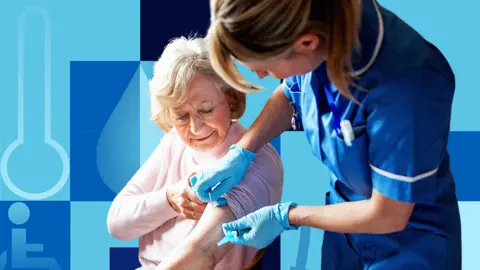 Getty Images/BBC
Getty Images/BBCThe Government of England is planning the biggest rethink of the NHS in its history.
It follows a damning report by independent peer surgeon Lord Darzi, which warned that the health service is in “critical condition”.
The Prime Minister said that a new 10-year plan it will be based on three concepts: greater use of digital technology, more emphasis on social care, and prevention of illness in the first place.
All over the NHS there are already pockets of innovation – and these local policies could help the wider NHS for years to come.
Tests and scans in stores
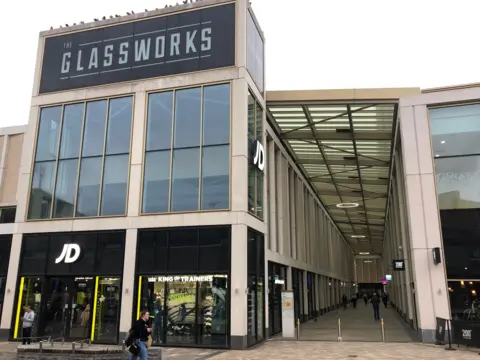
Every month the NHS carries out around 2.5 million tests and diagnoses, including things like cancer and heart disease.
Aging or missing equipment, and some hospitals scrambling for patients to access it, means the NHS is struggling to carry out diagnostic tests quickly.
More than a fifth of patients waited longer than the prescribed six-week period.
One solution has been new centers in public spaces – including Barnsley shopping centre, The Glass Works.
The NHS screening center opened in 2022, offering everything from ultrasounds and X-rays to breast exams and bone marrow scans.
The center’s impact has been immediate, reducing wait times for bone scans from six weeks to one, and increasing uptake of breast screening by nearly 50%.
It is one of 165 community testing centres, with others located on high streets, university campuses and football stadiums.
The aim is to increase the capacity to carry out nine million tests a year – but a shortage of key staff such as radiologists, who interpret and read the tests, could make that difficult.
Virtual Wards
Virtual Wards aims to provide hospital-level care at home.
Using equipment and remote monitoring, patients with respiratory problems, heart disease and weakness are kept at home under the care of a hospital consultant. Nursing home visits can be arranged where needed.
NHS England has encouraged local services to accept them over the past few years for those considered fit for service (patients whose condition is not rapidly deteriorating).
There are now more than 11,000 beds in England, compared to the actual 100,000 beds. Scotland, Wales and Northern Ireland are also investing in them.
Some studies have shown that for every two to three patients cared for in a ward, one hospitalization is prevented.
However, not surprisingly for something that has been passed around so quickly, there have been some teething problems.
Research by the National Institutes of Health has shown that collective success, with some areas struggling to find the right technology and another study finding a real ward bed costs twice as much as a real hospital bed.
Operating rooms – with patient video diaries
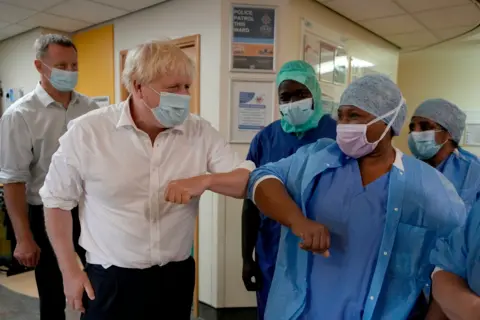 PA Average
PA Average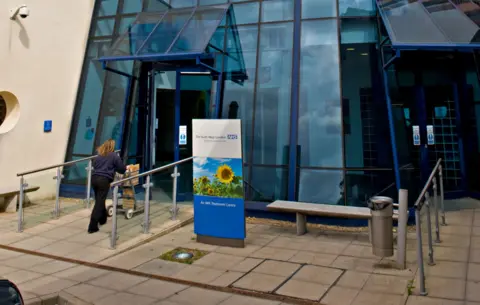 Alamy
AlamyTreating patients six days a week, often late into the evening, the South West London Elective Orthopedic Center’s five operating theaters are among the busiest in the NHS.
This group is only for non-emergency treatment, such as knee and hip surgery, and has a dedicated team of surgeons, nurses, physios and other health workers. It receives more than 5,000 treatments and surgeries a year.
The idea is to deal with waiting lists in an area where beds and theaters are not needed for emergency care, which often causes delays.
Patients are discharged quickly – about 60% leave in one day – and report to the staff of the center through video diaries, so that their rehabilitation can be monitored.
It is a model that is now being implemented across the country. There are over 100 surgeries in England that focus on high-end, complex procedures.
The NHS, which represents health chiefs, believes children can play a “vital role” in dealing with the 7.6 million people waiting list. It costs the number of hubs to double.
So far, the results seem to be good. Research suggests that hubs increase the number of treatments being carried out by more than a fifth in the areas where they are introduced.
However, the bottom line is that these areas require initial investment to build new entertainment venues and renovate hospital buildings.
It was a matter that was noticed by Lord Darzi when he revealed the report: “We usually have workers, but not theaters. It is not productive. ”
Quick release groups
About one in eight beds is occupied by a patient who is ready to leave the hospital, but cannot because they need support at home.
In some areas, hospitals are getting around this by creating teams to help discharge patients quickly and support them at home. These are made up of care workers, doctors and nurses.
Instead of spending time doing comprehensive assessments in the field, patients are sent home with the knowledge that there is a team ready to step in and organize support.
Interestingly, patients – who are familiar with their own home – are often found to have lower care needs than hospital staff thought.
Oxfordshire launched its joint discharge to assess team late last year.
During the winter, they were asked to support 105 patients to return home and were in a position to help 91.
The director of the Council for Senior Citizens’ Care, Karen Fuller, is pleased with the result, but says it is not without problems.
Ms Fuller said the teams were currently “working seven days a week”.
And this is a major obstacle to further progress. Such projects are highly dependent on the courts, and funding is tight.
The government has promised social care reform alongside its new plans for the NHS. With more money, councils say they can hold the key to freeing up hospital beds.
Lung cancer screening trucks
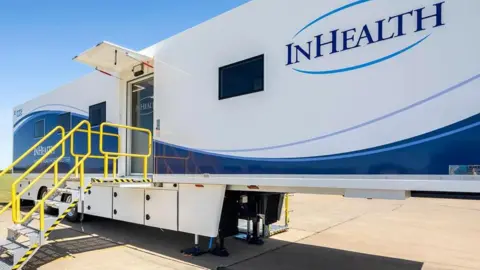 NHS
NHSLung cancer screening trucks are testing people in supermarkets, sports centers and football stadiums.
Invitations are sent to people in the area who are considered to be at greatest risk – particularly smokers and ex-smokers aged 55 to 74.
People do a lung health check and if there is a concern, they can be checked immediately or at a local hospital.
Chief Darzi warned that the high number of people dying from cancer is a matter of great concern.
Early detection of cancer in the first and second stages means that it is easier to treat, and the chances of survival are higher.
More than 3,000 lung cancer cases have been diagnosed using trucks – three quarters in stage one and two. Some have also been diagnosed with respiratory disease.
The project started in Manchester and Liverpool, but has gradually been extended to other parts of the country over the past five years.
This is one of the many ways to diagnose cancer.
More people are being screened for bowel cancer, after the age at which people are invited to come forward has been reduced.
Instructing dance and art
The NHS not only has to be there for people with health needs, it has also become a crutch for those struggling with other areas of their lives.
Walk into any GP surgery, and as well as those with illnesses and diseases, you will find many people seeking help for the effects of social problems – debt, depression, loneliness and practice.
In fact, it is estimated that about one in five people who choose to become a Doctor are for non-medical reasons.
To tackle this, the NHS has been investing in community referrals, where patients are referred to activities and support such as volunteering, arts, gardening, befriending, walking schemes and dance groups. .
In addition to helping those with untreated problems, these “social guidelines” can also help others with mental illness, or long-term conditions such as diabetes and heart disease.
The Royal College of GPs describes social prescribing as “a vital lifeline” for their patients, particularly in the wake of the cost of living crisis, and think tank The King’s Fund said in a statement In the past there is evidence that it can lead to. “various health and wellness outcomes”.
The idea was promoted in the NHS Long Term Plan 2019. This led to investment in liaison officers, who help GPs link access to services and services provided by councils and community and voluntary sectors.
#Wards #diagnostic #buses #fix #NHS
